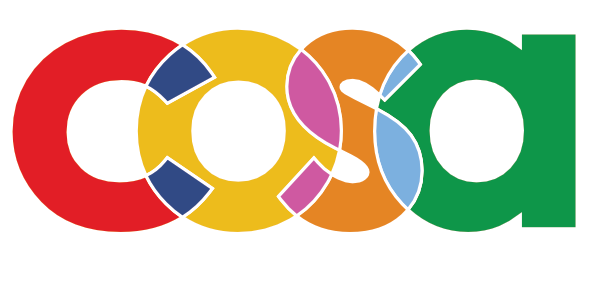
About COSA
# Learn more about the Clinic for Open Source Arts
COSA
The Clinic for Open Source Arts
- Founder and Director:
Chris Coleman - Associate Director:
Laleh Mehran
The Clinic for Open Source Arts
The Clinic for Open Source Arts is focused on helping free and open-source digital tools to improve their health by engaging the tool contributors and communities to think about growth, access, engagement, and sustainability.
Our Story
We launched the Clinic for Open-Source Arts (COSA) to open up the conversation around the intersection of open source software and the arts. When you consider ‘open source software’ in isolation, you explore how tools are made and sustained, and when you discuss ‘the arts’ you’re probably going to look at aesthetics, creativity, and collaboration — we believe these conversations are not mutually exclusive. Thanks to generous funding and support from the Knight Foundation, the Mellon Foundation, the Emergent Digital Practices program,and the Madden Center for Innovation in the Liberal and Creative Arts at the University of Denver, we’re spending the next several years exploring why some open source creative tools flourish, others struggle, and many wither away. By tapping into the knowledge of creators and stakeholders associated with ‘success stories’ we hope to identify what these communities have done to promote inclusivity and resilience, so we can share that knowledge with communities creating other tools. In a world dominated by big corporate players like Adobe and Apple, we want to ensure that free, noncommercial tools are robust and accessible — so creatives all over the world can continue to learn and express themselves.
So what is a ‘flourishing’ open source tool? The graphical library and integrated development environment Processing is an enduring example. Thanks to a concerted effort by its team, tens of thousands of students, artists, and hobbyists worldwide use it to learn to code, first as novices and then later in a professional capacity. What steps were taken to get Processing into so many classrooms since its development began two decades ago? How have the strategies for documentation and community outreach evolved? How was diversity amongst contributors encouraged? These are social questions, not technical questions.
The ‘C’ in COSA stands for clinic, a reference to treatment, maintenance, and care. For every Processing, dozens of open source tools end up as abandonware. Some software never acquires the user base required to justify ongoing development; while other tools becomes wildly popular, putting the needs of a community of thousands on a few developers; other projects become chronically neglected or just die overnight when the developer’s circumstances change dramatically (e.g. they have a child, take on a demanding job, or have health problems). The key point here is that open source software development around niche creative tools is very fragile. So COSA is a clinic — we want to diagnose what teams can do better and provide treatment by helping them plan how they’ll move forward.
COSA is examining open source tools in the arts across four domains: innovation, access, community, and sustainability. Innovation entails tools that push boundaries and open up new possibilities for users; access assesses if the tools have ‘on ramps’ so new contributors and users can get involved with minimal friction; community considers the ties that bind the people around a tool; and sustainability is all about resilience — for example, can a project endure the departure of a founder without falling apart? By looking at these qualities closely across several tools and communities, we’ll identify and share best practices.
Our Activities/Methods
COSA is already active on several fronts:
- Summits: We fund host yearly summits at the University of Denver that bring together users, developers, and educators around innovative open source software. In 2015 we hosted a Processing Development Sprint, in 2016 we focused on OpenFrameworks education, and in fall 2019 we hosted a summit for OpenFrameworks contributors. By bringing stakeholders together, we help development push forward and facilitate the creation of stronger ties within communities.
- Fellowships: We provide fellowships and small grants to fund artists doing compelling work with emerging tools. Our first COSA contributor-in-residence was the Brooklyn-based interdisciplinary artist, creative technologist, and researcher Ari Melenciano. Ari used this support to develop a series of tutorials on getting started in creative technology. In an interview about the residency she described how to challenge orthodox thinking around ‘open source’ in higher education “…you have to know the rules in order to break them. Thinking about the whole institutional framework can create more equitable experiences for people of all needs.”
- Clinics: We organize events that bring together small groups to speak frankly about what is working and not working in the open source software communities they are participating in. We hosted three clinics last year that brought together about twenty discussants: at UCLA in Los Angeles, and at Babycastles and NYU in New York.
(Thanks to Greg J Smith for his work on this text, drawn from COSA documents and the Clinic transcripts.)
Funding and Support
COSA began with events funded by the Emergent Digital Practices Program starting in 2015, followed by a grant from the Knight Foundation in 2018. Continued support has come from the Madden Center for Innovation in the Liberal and Creative Arts in the College of Arts and Humanities at the University of Denver. COSA has also received National Endowment for the Arts grants in 2020, 2021, 2022, and 2023. In 2024 COSA moved to The Ohio State University in connection with the Advanced Computing Center for the Arts and Design.
